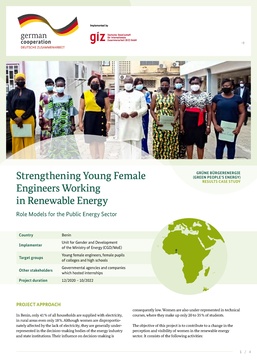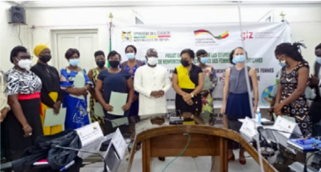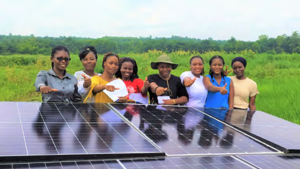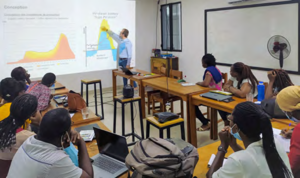Strengthening Young Female Engineers Working in Renewable Energy in Benin
Strengthening Young Female Engineers Working in Renewable Energy in Benin
Project Approach
In Benin, only 41 % of all households are supplied with electricity, in rural areas even only 18 %. Although women are disproportionately affected by the lack of electricity, they are generally underrepresented in the decision-making bodies of the energy industry and state institutions. Their influence on decision-making is consequently low. Women are also under-represented in technical courses, where they make up only 20 to 35 % of students.The objective of this project is to contribute to a change in the perception and visibility of women in the renewable energy sector.It consists of the following activities:
To increase the participation of young female engineers in the public energy sector, the project offers young female electrical engineers (selected through a competitive process) a 14-month traineeship at the Ministry of Energy (MoE) and its related public institutions to qualify them for a subsequent employment. The young female engineers are accompanied by mentors within the companies who provide them with technical and general support. The training programme consists of many components, such as project site visits and various trainings on aspects like solar energy, electrical networks, computer science, administration, and political aspects of electrification in Benin.
At the same time, the Unit for Gender and Development (CGD) of MoE intends to mainstream gender and build capacities in key institutions responsible for energy development in Benin. In doing so, the project defines and pursues individual capacity improvement goals for the female engineers in the participating institutions. In order to increase the overall visibility of women in technical professions, career awareness events are held for female students from five colleges and one high school. The technical engineers share their practical experiences during these events.
Methodology of Data Collection
Data for this case study report was collected through a review of project documents, four qualitative interviews with a total of ten interviewees. These interviews were carried out with representatives of GIZ and CGD/MoE, as well as with two groups consisting of the eight female engineers who have been trained during the project. The case study was conducted from March to April 2023 after the project implementation was concluded.
Key Findings
Project Achievements
A total of eight young female engineers participated in the 14-month traineeship programme at the MoE and other public institutions, such as the Beninese Agency for Rural Electrification and Energy Management (ABERME), the Beninese Company of Electrical Energy (SBEE), and the Beninese Company of Electricity Production (SBPE) with the DEFISSOL Solar Power Plant Project. Also other international and national engineering companies have participated as hosts for the female engineers in the programme.
The participants of the traineeship programme report that they were able to grow not only professionally, but also personally, for instance by speaking in front of large audiences. In addition, a total of 2,182 girls and young women learned about career opportunities for female engineers in awareness-raising events at schools and universities. The female engineers, who carried out the events, report that they are seen as role models by the young girls, some of whom were inspired to follow their example.
Intermediate Impact
Beyond the direct project achievements described above, therev are already measurable further intermediate effects. In particular, all eight female engineers now have been employed, four of them with SBEE and the other four with SBPE, where they work in the DEFISOL Solar Power Plant Project. CGD/MoE, ABERME, SBEE, and SBPE have supported them in the recruitment process as part of the project. Through their improved professional skills, these young women have been able to increase their financial independence and even offer financial support to their families. One desired effect of the awareness campaigns is that young girls will also decide to pursue technical careers. It will take some years to see if this will materialise. However, according to a representative of CGD/MoE, the percentage of women employed in public institutions under the leadership of MoE has increased from only 1.7 % before the project implementation to 8.4 % now.As more and more women are represented in the energy sector, it is possible that energy-related topics of particular interest to women will receive more attention. This is especially true for the severe disadvantage women face due to lack of access to electricity, which could be addressed more intensely in the future. Moreover, a representative of CDG/MoE mentioned, the project “has changed the perception of technical women in the sector, they bring an added value in all the sectors where they work.” For example, not a single woman has previously been employed at ABERME in a technical job, but because of the female engineers, it is now seen as normal for women to work in technical energyrelated fields. Another example comes from the female engineers’ function as role models which has increased the acceptance of an engineering career within the families of the young girls and women who have participated in the awareness-raising events. This observation is cited by the female engineers.
Challenges in Project Implementation
Three main challenges could be identified. Firstly, the general employment conditions in the energy sector in Benin are difficult for both women and men due to a high unemployment rate. As mentioned by one of the female engineers, this has led to expressions of frustration from a single man who felt discriminated against because he could not benefit from the project support.
Secondly, there are deep-rooted prejudices, both on the side of men, but also among the women themselves. For instance, as one interviewee mentioned, men in the industry think that “women are weak”. Such prejudices pose not only a challenge for women themselves, but also for a project that specifically aims to break down these prejudices and imbalances, as it can be difficult to change such deeply held cultural beliefs.
Thirdly, the contractual conditions for the female engineers are not yet known. After the contracts expire, these women may again face the challenge of finding a job in an environment of high uncertainty and unemployment. However, the experience gained during the traineeship and employment will certainly give them an advantage.
Lessons Learned
Several factors contributed to the success of the project. Through an efficient communication concept, the project coordinator shared regularly information about the project, its approach and the idea of how to train the female engineers with all partners and stakeholders involved, such as the MoE representatives, contact persons of the participating companies, mentors, etc. This was complemented by regular meetings, both digital via WhatsApp and physical. This has enabled efficient and committed cooperation between the stakeholders.
Secondly, during the training of the female engineers, the participants have been entrusted with the responsibility for specific, precise tasks. They have been able to work on these assignments on their own accountability, which contributed to a great learning effect and motivation of the trained female engineers.
Thirdly, the success of the awareness-raising campaign can be attributed to its implementation by the female engineers who act as real-life role models. This has helped to make the information provided more practical and to increase the interest and motivation of girls and young women to take up a technical profession.
Sustainability of the Intervention
Based on the available information, the sustainability of the intervention cannot yet be concretely assessed. The employment contracts that the female engineers received give an indication of sustainability, but the terms of these contracts are not clear at this stage. It is therefore not certain whether the increased representation of women in the energy sector will have a lasting effect.
However, SIEMENS Energy has already offered to hire women engineers if a new similar project is implemented in Benin, which shows that there is interest in a female workforce in Benin’s energy sector. The CGD/MoE representative stated that a proposal for a similar but enlarged follow-up project with more female participants is already being prepared.
Conclusion and Outlook
The project addressed a considerable imbalance between men and women in Benin’s electrical engineering sector. As one interviewee puts it: “Everyone is aware of the poor situation of women, so it was well received by all stakeholders.” The participants report that the traineeship was adapted to their specific needs, taking into account their different backgrounds and qualifications. The programme covered a wide range of relevant topics in a combination of theoretical knowledge transfer and practical working experience, which is highly appreciated by the female engineers.Interestingly, one of the female engineers did not feel particularly disadvantaged because of her gender before the project started, but rather sees a general problem of a lack of job opportunities in the energy sector affecting both women and men alike. In this sense, one young man complained about being disadvantaged by the women-only approach of the project. Nevertheless, the project’s focus on women is considered appropriate and highly relevant due to the severe underrepresentation of women in engineering positions.The project was described as “innovative”, as synergies between GIZ and MoE were used, and the promotion of women engineers in the energy sector by setting an example represents a new approach. Coupled with the awareness-raising measures, the first signs are indicating that the project is indeed achieving the desired multiplier effect.
By involving female engineers, both the theoretical knowledge and the technical skills of women could be tested and made visible, thereby contributing to a change in the perception of women in engineering positions. The following quote from a representative of the political partner reflects this: “Women have shown what they can do.”
With regard to the expansion and replication of similar project activities to strengthen the role of women in the energy sector the following recommendations can be made:
- Cooperation with private companies operating in the electrical sector to make private investments and not depend on public sector investments only can also contribute to the financing of the measure. For instance, a public private partnership (PPP) may be an opportunity.
- The admission criterion of age between 22 and 35 years applied in the project seems reasonable for an internship programme. However, other programmes might also consider targeting older women in order to attract a larger number of female engineers with a more diversified background of experience.
- Finally, the promotion of gender equality with such a practical model approach in public agencies can be one pillar for similar projects, creating a sustainable contribution to further gender mainstreaming at the decision-making level in the energy sector.



















